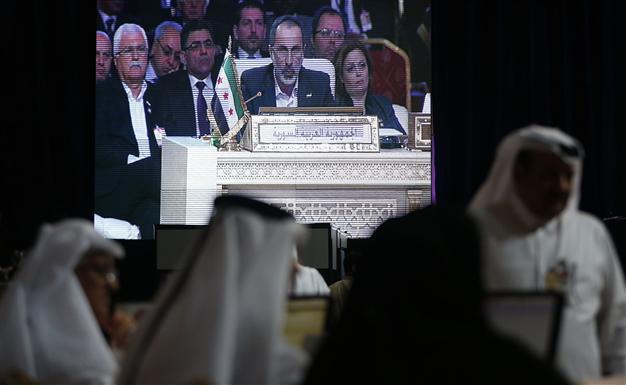Syria opposition asks US for Patriot missile protection
DOHA/DAMASCUS - Agence France-Presse

Ahmed Moaz al-Khatib, head of the Syrian opposition delegation, appears on a screen as he addresses the opening of the Arab League summit in the Qatari capital Doha on March 26, 2013. AFP Photo
Syrian opposition chief Ahmed Moaz al-Khatib said Tuesday he has asked the United States to extend NATO's Patriot missile system to protect rebel-held areas in the north of the war-torn country."I have asked (US Secretary of State) Mr John Kerry during our meeting to provide Patriot (missile protection) that encompasses northern Syria, and he has promised to look into the matter," said Khatib at an Arab summit in Doha, Qatar.
"We are still awaiting a decision from NATO on this matter." NATO's sole involvement in Syria's brutal civil war to date has been to position Patriot missile batteries along the Turkish border in order to prevent any air or missile launches from the Syrian side.
"The United States has a bigger role" which it could play beyond offering humanitarian aid worth "$350 million," said Khatib.
Damascus slams Arab League seat transfer to rebels
Damascus slammed the Syrian opposition for its "theft" of the country's Arab League seat on Wednesday, calling it a "legal, political and moral crime." The comments, published in pro-regime newspapers, came shortly before opposition leader Ahmed Moaz al-Khatib addressed an Arab League summit in Doha, as the seat was handed to the opposition.
"This theft that the sheikhdom of Qatar and other collaborator, treacherous, backward Arab regimeshave committed by handing the Doha-sponsored Coalition the Syrian state's membership... is a legal, political and moral crime," the Tishreen newspaper wrote.
The Syrian state under President Bashar al-Assad "still exists in its people, army, institutions, services, and its legislative, executive and judicial authorities that exercise (the country's) full sovereignty", the daily added.
"Shame on you, Arab brothers." Syria's membership in the Arab League was suspended in November 2011 and the organisation had said it would hand over the seat to the opposition once it took steps to set up an executive body.
Set up in Doha in November 2012, the Coalition has been recognised by dozens of states and organisations as legitimate representative of the Syrian people, and earlier this month it elected its first rebel prime minister.
The Al-Watan newspaper said the Arab League's decision to hand over the seat "opens the way to hold accountable any state that hands the embassy to opponents", while blaming foreign states for creating dissent against Assad's regime.
The opposition's takeover of the Syrian seat "will pose a danger of the gravest kind to international and diplomatic relations", it said, adding that the "biggest losers... will be the Thani clan (of Qatar)... and the Saudi clan".
Damascus "is not affected at all by the loss of its seat... because this league does not represent Syria's beliefs", the daily added.
The Arab League was "a heavy burden on the Syrian people and state, and on the Syrian collective conscience", Al-Watan said.
















